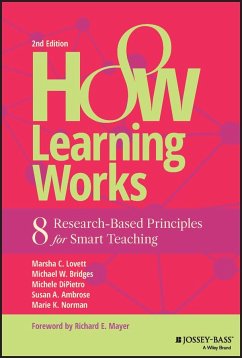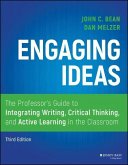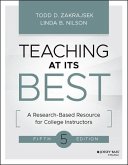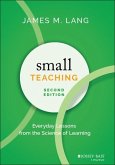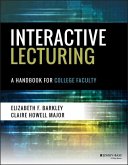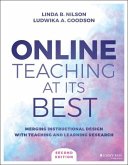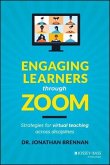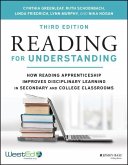Apply these eight learning principles for more effective teaching
As educators in the ever-evolving landscape of higher education, we are continuously challenged to keep our courses effective, engaging, relevant, and inclusive. The updated and expanded second edition of How Learning Works can help! It incorporates the latest research, provides a wider range of strategies, and adds a new principle to your toolkit.
Readers will find eight essential learning principles that distill the overwhelming research literature into:
_ Real-world teaching and learning scenarios
_ Examples that reflect a diverse set of teaching environments and learner populations
_ 150 practical strategies you can apply to your teaching context
With these practical, broadly applicable insights, you can:
_ Understand why your successful teaching approaches work
_ Solve common teaching and learning problems
_ Adapt your teaching to new modalities (e.g., online, hybrid) and challenges
_ Ground your innovations in evidence-based practice
Based on research from cognitive psychology, developmental psychology, education, anthropology, and more--this book makes learning work...for you and your students.
As educators in the ever-evolving landscape of higher education, we are continuously challenged to keep our courses effective, engaging, relevant, and inclusive. The updated and expanded second edition of How Learning Works can help! It incorporates the latest research, provides a wider range of strategies, and adds a new principle to your toolkit.
Readers will find eight essential learning principles that distill the overwhelming research literature into:
_ Real-world teaching and learning scenarios
_ Examples that reflect a diverse set of teaching environments and learner populations
_ 150 practical strategies you can apply to your teaching context
With these practical, broadly applicable insights, you can:
_ Understand why your successful teaching approaches work
_ Solve common teaching and learning problems
_ Adapt your teaching to new modalities (e.g., online, hybrid) and challenges
_ Ground your innovations in evidence-based practice
Based on research from cognitive psychology, developmental psychology, education, anthropology, and more--this book makes learning work...for you and your students.
"Since the publication of the original How Learning Works, I have returned again and again to its thorough and readable summaries of the most important research on student learning. This second edition has become an even more essential resource for faculty, as the authors have infused the book's recommendations with greater awareness of the social, emotional, and cultural factors that impact student identity and development."
--James Lang, Author of Small Teaching
"How Learning Works is a poignant and provocative book that engages meaningfully and intentionally with the intellectual and affective dimensions of teaching and learning that shape our complex and diverse higher education classrooms. Presenting a well-researched, relevant and socially conscious range of cognitive and social principles and practices, the authors explore what it means to engage intentionally with students as whole beings, in a socially just, inclusive and pedagogically responsible way."
--Kasturi Behari-Leak, Dean of the Centre for Higher Education Development, University of Cape Town
"The Second Edition of How Learning Works is superb. I particularly admire its breadth of coverage, which includes socio-emotional and cognitive components of learning. I highly recommend it for anyone at any level in education."
--Henry L. Roediger, III, James S. McDonnell Professor of Psychology; Washington University in St. Louis, Co-author of Make It Stick: The Science of Successful Learning
"How Learning Works is the essential book on teaching and learning in higher education. The new edition is even better than the original. Drawing deeply on recent research to outline eight principles of How Learning Works, the authors provide practical guidance to put those principles into action. This book is smart, useful, and inspiring!"
--Peter Felten, Executive Director, Center for Engaged Learning, Elon University
"This book provides tremendous benefits to anyone who wants to engage students and facilitate learning in a higher education context. The authors have pruned the extensive research about how learning works into eight principles and their associated implications. Each chapter contains relatable challenges and offers evidence-based approaches for addressing them."
--Bonni Stachowiak, Host + Producer, Teaching in Higher Ed Podcast
"How Learning Works is the perfect title for this excellent book. Drawing upon new research in psychology, education, and cognitive science, the authors have demystified a complex topic into clear explanations of eight powerful learning principles. Full of great ideas and practical suggestions, all based on solid research evidence, this book is essential reading for instructors at all levels who wish to improve their students' learning."
--Barbara Gross Davis, assistant vice chancellor for educational development, University of California, Berkeley, and author, Tools for Teaching
"As you read about each of the eight basic learning principles in this book, you will find advice that is grounded in learning theory, based on research evidence, relevant to college teaching, and easy to understand. The authors have extensive knowledge and experience in applying the science of learning to college teaching, and they graciously share it with you in this organized and readable book."
--Richard E. Mayer, professor of psychology, University of California, Santa Barbara; coauthor, e-Learning and the Science of Instruction; and author, Multimedia Learning
--James Lang, Author of Small Teaching
"How Learning Works is a poignant and provocative book that engages meaningfully and intentionally with the intellectual and affective dimensions of teaching and learning that shape our complex and diverse higher education classrooms. Presenting a well-researched, relevant and socially conscious range of cognitive and social principles and practices, the authors explore what it means to engage intentionally with students as whole beings, in a socially just, inclusive and pedagogically responsible way."
--Kasturi Behari-Leak, Dean of the Centre for Higher Education Development, University of Cape Town
"The Second Edition of How Learning Works is superb. I particularly admire its breadth of coverage, which includes socio-emotional and cognitive components of learning. I highly recommend it for anyone at any level in education."
--Henry L. Roediger, III, James S. McDonnell Professor of Psychology; Washington University in St. Louis, Co-author of Make It Stick: The Science of Successful Learning
"How Learning Works is the essential book on teaching and learning in higher education. The new edition is even better than the original. Drawing deeply on recent research to outline eight principles of How Learning Works, the authors provide practical guidance to put those principles into action. This book is smart, useful, and inspiring!"
--Peter Felten, Executive Director, Center for Engaged Learning, Elon University
"This book provides tremendous benefits to anyone who wants to engage students and facilitate learning in a higher education context. The authors have pruned the extensive research about how learning works into eight principles and their associated implications. Each chapter contains relatable challenges and offers evidence-based approaches for addressing them."
--Bonni Stachowiak, Host + Producer, Teaching in Higher Ed Podcast
"How Learning Works is the perfect title for this excellent book. Drawing upon new research in psychology, education, and cognitive science, the authors have demystified a complex topic into clear explanations of eight powerful learning principles. Full of great ideas and practical suggestions, all based on solid research evidence, this book is essential reading for instructors at all levels who wish to improve their students' learning."
--Barbara Gross Davis, assistant vice chancellor for educational development, University of California, Berkeley, and author, Tools for Teaching
"As you read about each of the eight basic learning principles in this book, you will find advice that is grounded in learning theory, based on research evidence, relevant to college teaching, and easy to understand. The authors have extensive knowledge and experience in applying the science of learning to college teaching, and they graciously share it with you in this organized and readable book."
--Richard E. Mayer, professor of psychology, University of California, Santa Barbara; coauthor, e-Learning and the Science of Instruction; and author, Multimedia Learning

